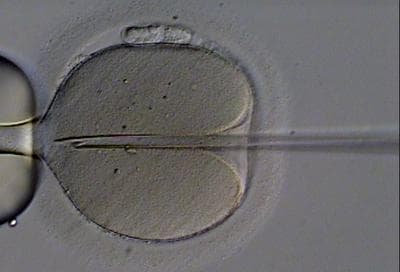Advertisement
How Being Obese May Hinder Pregnancy: Eggs Gone Awry

The more obese you are, the harder it is to get pregnant, and a study just out in the journal Human Reproduction offers some new insight into why. For the 1/3 of American women of childbearing age who are obese, its concrete images of eggs gone awry may also offer a bit of added incentive to lose weight before trying to get pregnant.
The study, led by Dr. Catherine Racowsky of Brigham and Women's Hospital, found that in severely obese women who underwent fertility treatments, the eggs that failed to fertilize were more likely to have abnormal structures and disorganized chromsomes than the eggs in normal-weight women.
In particular, the eggs in the obese women were roughly twice as likely to have double "spindles." The spindle is something like the axis around which the gene-bearing chromosomes organize themselves; for an egg to fertilize normally, it must have a single spindle. (See the image below.)

How, I asked Dr. Racowsky, might all this work? How might obesity lead to double spindles and other egg malformations?
'The egg, of course, develops in the ovary," she replied, " and the immediate environment in which the egg develops is called the follicle. And we know from other studies that there are various abnormalities in the follicles of women who are obese. A lot more work needs to be done to understand how these abnormalities in the follicles relate to abnormalities in the eggs, but we do know that the relationship between the health of the follicle and the health of the egg is of paramount importance."
In the paper, I said, I caught hints of a couple of familiar elements that may go wrong in the follicles of obese women. There were mentions of leptin, an obesity-related hormone involved in appetite and metabolism, and of inflammation, which has also been found to increase in obesity.
"That's probably the tip of the iceberg, frankly," she replied. "There's probably a lot more about the changes in the follicle in women who are obese that we haven't investigated yet." But yes, she said, it is correct that cytokines — inflammation — and the concentration of leptin in the follicle have been shown to be linked to obesity. It remains unclear, she said, exactly how obesity's chemical effects on the follicle would lead to abnormal structures; more research is needed.
What is clear, Dr. Racowsky said, is that there's "a linear relationship between the weight of a woman above normal and the difficulty in conceiving. So anything a woman can do, if she's attempting to conceive, to make her body more healthy, she should do. But because we know this is a direct relationship, one thing she should absolutely do is try to reduce her weight" if she's obese.
Beyond fertility, there's a whole raft of other reasons to aim for a normal weight before pregnancy. Read them here: 10 scary reasons to fight obesity before pregnancy.
If an obese woman does lose weight, I asked, do we know that her fertility will improve?
A paper published just a couple of months ago showed that "in the very short term, if there's weight loss, there's an increase in mature eggs retrieved from IVF patients," she said. And "we know that if a woman loses weight, her likelihood of pregnancy increases, so it does seem to be partially reversible."
More details on the study from the press release:
Racowsky and her colleagues examined 276 mature human eggs (Fig. A in the image below) that failed to fertilize from women who were undergoing in vitro fertilization (IVF) procedures. Of these, 105 eggs were from severely obese women, defined as having a body mass index (BMI) between 35.0 and 50.1 kg/m2, and 171 eggs were from women with a normal BMI, defined as between 18.5 and 24.9 kg/m2. BMI is calculated from a person's height and weight and is considered a reliable indicator of body fatness for most people...
Nearly 60 percent of the eggs from the severely obese group had two spindles, while only 35 percent of the eggs from the normal BMI group had two spindles.
· Among the eggs with one spindle, nearly 30 percent of the eggs from the severely obese group had disorganized chromosomes (Figs. C and D), while only 9 percent of the eggs from the normal BMI group had disorganized chromosomes.
Dr. Racowsky points out that this study only used eggs that were stimulated through IVF and that failed to fertilize, so it is not known if these results can be broadly applied to all eggs.
“More research is needed to determine what is causing the spindle abnormalities and disorganized chromosomes,” said Dr. Racowsky.
And Dr. Racowsky's top takeaways:
•Weight affects a woman's ability to conceive (being excessively underweight as well as overweight.)
•There's something you can do about it, because it does seem to be partly reversible.
•We don't know of any weight above which a woman simply can't conceive. There's never no hope whatsoever, but we know, because of all the health issues related to obesity, that it's really important to control weight.
And from the study itself:
•To my knowledge, it's the first study that looked in a very detailed way at the structure of the human egg as it relates to obesity.
•And it really provides insight to women on the importance of having a healthy body and being in a normal weight range if you're going to try to get pregnant.
This program aired on September 11, 2012. The audio for this program is not available.
